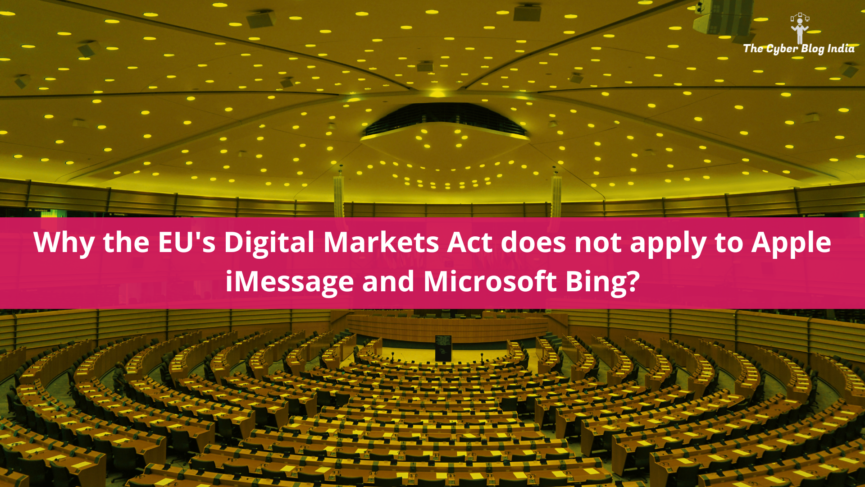Why the EU’s Digital Markets Act does not apply to Apple iMessage and Microsoft Bing?

The Digital Markets Act (DMA) (“Act”) is an attempt by the European Commission to support and strengthen the aim of previously existing competition laws. It targets fair play while fostering true competition and innovation in the digital era. The Act targets large companies known as “gatekeepers” and controls them with regulations and obligations. However, pre-set criteria exist to avoid overregulation and disturb a healthy balance. Margrethe Vestager, the Executive Vice-President of “A Europe Fit for the Digital Act” at the European Commission, said, “Today marks a turning point for our European digital space. The DMA sets precise obligations and the possibility to sanction large online platforms should they not comply.” The importance of well-targeted regulation cannot be more emphasised to ensure justice to the aim of the legislation. This lays the foundation for provisions to grant exemptions to certain market players that may prima facie look like gatekeepers but are not.
Apple’s iMessage and Microsoft’s Bing search engine are two examples of services that enjoy the privilege under the Act. As these exemptions significantly impact the market functioning and outcomes, we explore why this privilege is for iMessage and Bing.
The Concept of Gatekeepers
DMA is a landmark regulatory framework for the digital markets. It became applicable on 02 May 2023 for most parts. Its primary aim is to ensure fair and healthy competition in the digital markets. The Act attempts to establish control over larger businesses and ensures a level playing field for the smaller ones. The European Commission classifies large platforms as “gatekeepers” that provide “core platform services” (CPSs). A few examples of designated gatekeepers are Alphabet, for its core services, Google Play and Google Maps, and Amazon for Amazon Marketplace and Amazon Advertising. The Act imposes rules and restrictions on such labelled gatekeepers. For example, it mandates allowing interoperability and data access, avoiding self-preferencing and most favoured nation (MFN) clauses. It aims to work in parallel with the EU’s competition law to ensure the best efforts towards achieving its aim of a just and fair market.
Criteria to be a Gatekeeper
The DMA does not attract all large digital platforms under its ambit as a gatekeeper. That excludes even the ‘dominant’ companies under the EU Competition law. Article 3(1) of the DMA specifies the criteria a platform must fulfil to be called a gatekeeper. This includes:
- Significant Impact on the Internal Market: The company must have substantial control over the market functioning and outcomes. It can also happen when the company is in a dominant position in the market or because of its large user base.
- Essential Gateway Role: The platform must be a crucial gateway between businesses and consumers through one or more CPS, allowing it to control markets’ access.
- Entrenched and Durable Position: Fulfilling the abovementioned thresholds in the last three financial years.
Exemption for iMessage and Bing: Relevant Factors
1. Apple’s iMessage
iMessage is Apple’s proprietary messaging service, known for its seamless integration across Apple devices. Despite its popularity among Apple users, iMessage does not qualify as a gatekeeper under the DMA due to the following factors:
- User Base and Market Penetration: iMessage is limited to Apple’s ecosystem; only users with Apple devices can use the service. This restricted availability reduces its overall user base in the EU.
- Comparison with Other Messaging Services: Unlike Meta-owned WhatsApp, which is available across multiple platforms and has a vast user base, iMessage’s reach is considerably smaller. This limitation significantly affects its market penetration and influence.
2. Microsoft’s Bing
Bing, Microsoft’s search engine, competes directly with Google Search but does not meet the DMA’s gatekeeper criteria due to the following factors:
- Market Share and User Base: Bing has a much smaller share of the search engine market in the EU than its other competitors, such as Google.
- Market Influence: With many users, Google dominates the search engine market, making Bing’s influence relatively minor. This disparity snatches Bing of the market influence, leading to non-fulfilment of the criteria mentioned under the DMA.
There are divided opinions about the utility and justification of these exemptions. While some think the exemptions are absurd, others support them. Lazar Radic, an antitrust expert at the International Center for Law and Economics, said, “It is a good sign that the Commission has considered market realities instead of just slapping the ‘gatekeeper’ label on iMessage because it fulfils certain quantitative thresholds.”
Implications of the Exemptions
- Competitive Landscape: These exemptions highlight the DMA’s approach to targeting only those services with substantial market control, one of its prominent criteria. By not regulating iMessage and Bing, the DMA exempts these services from various mandates and regulation requisites, such as not engaging in self-preferencing and MFN clauses. This essentially provides them an edge over their competitors engaging in similar services.
- User Impact: The DMA provides regulatory provisions such as the mandate to not cross-use data without consent, data access, and off-platform purchasing. These are for the benefit and protection of end-user privacy. Hence, these exemptions directly impact user choices and market outcomes.
Conclusion
The Digital Markets Act represents a significant step towards shaping Europe’s digital future. However, exempting Apple’s iMessage and Microsoft’s Bing underscores the DMA’s specific targeting criteria, primarily focusing on services with extensive user bases and market influence. Understanding these exemptions also clarifies the DMA’s regulatory intentions to ensure fair play in the market economy. It establishes a non-arbitrary nature with well-laid criteria for a “gatekeeper.” It supports innovation and technological development of companies without putting them under unnecessary duress of regulations and obligations. After all, protecting the spirit of a healthy digital market ecosystem should be the utmost priority.
